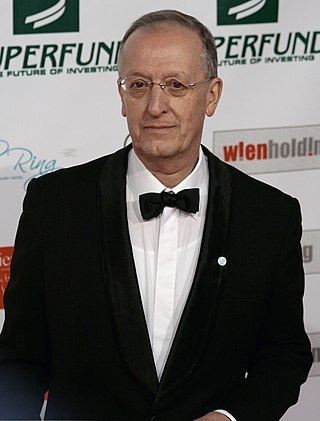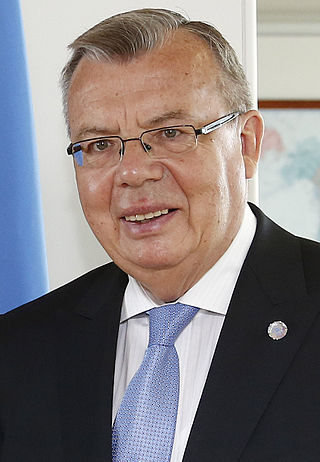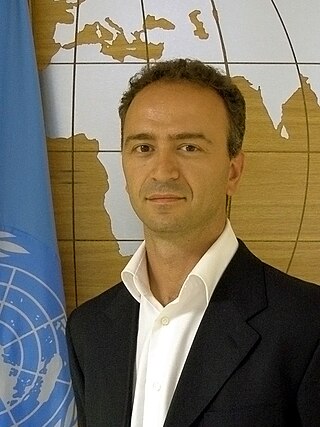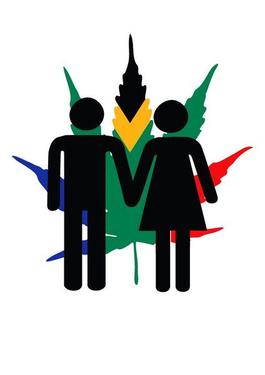Related Research Articles

The United Nations Office on Drugs and Crime is a United Nations office that was established in 1997 as the Office for Drug Control and Crime Prevention by combining the United Nations International Drug Control Program (UNDCP) and the Crime Prevention and Criminal Justice Division in the United Nations Office at Vienna,adopting the current name in 2002.

The Single Convention on Narcotic Drugs,1961 is an international treaty that controls activities involving specific narcotic drugs and lays down a system of regulations for their medical and scientific uses,concluded under the auspices of the United Nations. The Convention also establishes the International Narcotics Control Board.
The International Narcotics Control Board (INCB) is an independent treaty body,one of the four treaty-mandated bodies under international drug control law.

The Commission on Narcotic Drugs (CND) is one of the functional commissions of the United Nations' Economic and Social Council (ECOSOC),and is the central drug policy-making body within the United Nations System. The CND also has important mandates under the three international drug control conventions,alongside the three other treaty-mandated bodies:United Nations Office on Drugs and Crime,World Health Organization,and International Narcotics Control Board.

Antonio Maria Costa is an Italian economist. He lives in Vienna and Brussels.
The World Drug Report is a United Nations Office on Drugs and Crime annual publication that analyzes market trends,compiling detailed statistics on drug markets. Using data,it helps draw conclusions about drugs as an issue needing intervention by government agencies around the world. UNAIDs stated on its website "The use of illicit drugs needs to be understood as a social and health condition requiring sustained prevention,treatment,and care. This is one of the major conclusions emerging from the 2015 World Drug Report,published on 26 June by the United Nations Office on Drugs and Crime."
The International Association of Anti-Corruption Authorities (IAACA) is an independent and non-political anti-corruption organization established at its inaugural Annual Conference and General Meeting held in Beijing,China in October 2006. The main objective of the organization is to promote the effective implementation of the UN Convention Against Corruption,adopted by the United Nations General Assembly on 31 October 2003,and to assist anti-corruption authorities in the world in preventing and fighting against corruption. Currently,over 160 ACAs from different countries and jurisdictions have joined IAACA as members.

Yury Viktorovich Fedotov was a Russian diplomat. From 2010 to 2019 he served as executive director of the United Nations Office on Drugs and Crime (UNODC) and director-general of the United Nations Office at Vienna (UNOV) with the rank of Under-Secretary-General,after having previously served as the Ambassador of Russia to the United Kingdom.
The International Network to Promote the Rule of Law (INPROL) is a global,online community of practice,comprising 3,000+ rule of law practitioners from 120 countries and 300 organizations. INPROL works to assist specialists in the rule of law to stabilize war-torn societies.
The United Nations Interregional Crime and Justice Research Institute (UNICRI) is one of the five United Nations Research and Training Institutes. The institute was founded in 1968 to assist the international community in formulating and implementing improved policies in the field of crime prevention and criminal justice. Its work currently focuses on Goal 16 of the 2030 Agenda for Sustainable Development,that is centred on promoting peaceful,just and inclusive societies,free from crime and violence.

Francesco Cappè is Chairman and founder of the garagErasmus Foundation and former United Nations official and Head,Security policies,Dialogue and Innovation for the United Nations Interregional Crime and Justice Research Institute (UNICRI);in this position he designed and supervised,among others,the first UN programme on security policies for major events and the UN initiatives against violent radicalization. He was a member of the UN Counter-Terrorism Implementation Task Force (CTITF) of the UN General Assembly. He also worked as Senior Advisor for the General Confederation of the Italian Industries (Confindustria) and Chair of the Robert F. Kennedy Flagship on Mediterranean Challenges as well as board member and CEO of international companies and Higher Education Institutions. He is currently CEO and Head of Institution of Gioya,a boutique Higher Education Institution with the main Hq in Malta. He is Chief Representatives in Europe for the Shanghai Arbitration Commission.
Koli Kouame is a former United Nations civil servant from Côte d’Ivoire. He notably served as the Secretary of the International Narcotics Control Board (INCB) between 2004 and 2010. In this position,Mr. Kouame was in charge of the permanent staff in at the INCB in Vienna (Austria) working on the international drug control treaties.
The secretariat for multidimensional security of the Organization of American States is a part of the General Secretariat,which is headquartered in Washington,D.C.,United States. The Secretariat for Multidimensional Security has a mandate to promote cooperation between Organization's Member States,Inter-American and international organizations,as well as with entities such as the United Nations and its subsidiaries,in order to analyze,prevent,confront and respond to security threats.

The Dagga Couple or DC is a pro-cannabis lobbyist organisation from South Africa founded by Julian Stobbs and Myrtle Clarke after the two were arrested for the possession and dealing in the substance in 2010. Rather than plead guilty,the couple decided instead to sue seven sectors of government that maintained and enforced the policy of cannabis prohibition in the country resulting in what has been described locally as the Trial of the Plant in 2017.

Ali bin Mohsen bin Fetais Al-Marri is a Senior Qatari official and magistrate.

The Commission on Crime Prevention and Criminal Justice (CCPCJ) is a functional commission of the United Nations Economic and Social Council (ECOSOC) based in Vienna. The commission serves as the primary organ that guides the activities of the United Nations in the fields of crime prevention and criminal justice.

Ghada Fathi Waly is an Egyptian politician who has been serving as the director-general/executive director of the United Nations Office at Vienna (UNOV)/United Nations Office on Drugs and Crime (UNODC) since 2020,following her appointment by Secretary-General António Guterres. She holds the rank of Under-Secretary-General of the United Nations.

Antonia De Meo is an American lawyer and diplomat. She started serving as the Director of the United Nations Interregional Crime and Justice Research Institute (UNICRI) on March 30,2020
Andrés Finguerut is a former United Nations civil servant,successively secretary of the UN Commission on Narcotic Drugs,secretary of the International Narcotics Control Board (2011–2020) and chief of the drug prevention and health branch at the United Nations Office on Drugs and Crime (2020–2023).
The internationaldrug control conventions,also known as the United Nations drug control conventions,are three related,non self-executing treaties that establish an international legal framework for drug control. They serve to maintain a classification system of controlled substances including psychoactive drugs and precursors,to ensure the regulated supply of those substances useful for medical and scientific purposes,and to prevent other uses. They act as the legal underpinning of the US-led global campaign against illicit drugs known as the war on drugs. Ratification is near universal among UN member countries.
References
- ↑ Lucas Appointement news
- ↑ Lucas' replacement
- ↑ United Nations Interregional Crime and Justice Research Institute (2011). "Dr. Jonathan Lucas (Seychelles) is the new Director of UNICRI – Dr. Lucas has been appointed by the Secretary-General". unicri.it. Retrieved 2022-12-11.
- ↑ United Nations Interregional Crime and Justice Research Institute (2015). "Secretary-General Appoints Cindy Smith as new Director of UNICRI". unicri.it. Retrieved 2022-12-11.